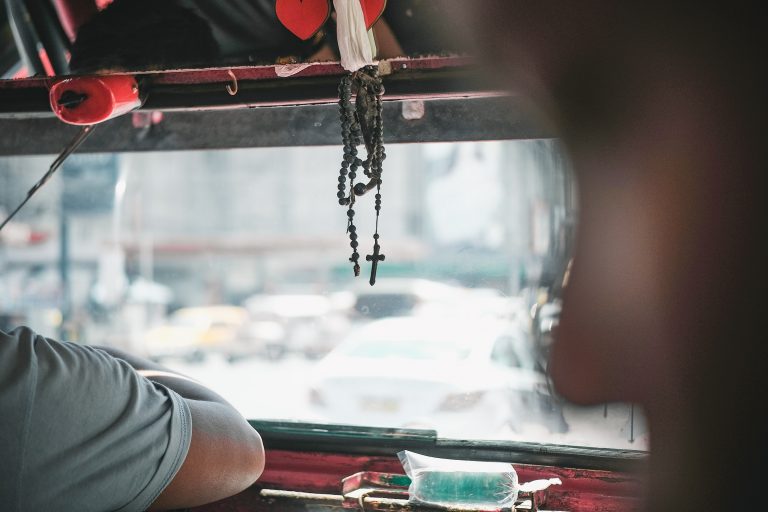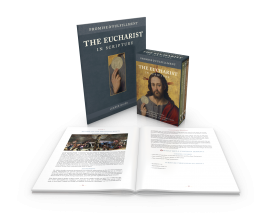By Leon J. Suprenant Jr.
Leon Supernant is the co-author of Faith Facts, a series of two books answering common questions on the Catholic faith. He also contributed to the Catholic for a Reason series.

At Mass, we encounter the mystery of Christ becoming truly present under the appearance of bread and wine. Even though the sacred species look exactly the same after the consecration as they did before the consecration, we know by faith that there’s a world of difference. Our Lord and Savior is truly present in our midst as our spiritual food. The change could not be more dramatic, nor more imperceptible.
That’s the objective reality of what we call transubstantiation. But what does our encounter with this mystery actually do to us? In other words, what about those of us who are standing in line for Holy Communion? Do we look any different as we walk back to our pews? After all, the Body and Blood of Jesus Christ are inside us. Are we any different fifteen minutes later, in the church parking lot or in the parish hall? Are we any different two or three days later? As we consider this issue, we quickly discover that the mystery of the Eucharist leads inexorably to the mystery of the Church and Christian living, just as the mystery of the objective redemption of humanity leads to a consideration of our own redemption.
From the first Christians, who gathered for the “breaking of the bread” (Acts 2:46), to parishes today, which Pope John Paul II calls “Eucharistic communities,” the Eucharist has always been an integral part of Christian living. Through the regenerative waters of Baptism, the baptized have become “new creations” (2 Cor. 5:17)—that is, Christian. Furthermore, Christians are exhorted not to return to their old ways, but rather to change further—to become more conformed to Christ (cf. Eph 4:17–24). This internal transformation is real, but not always perceptible. Saint Peter says: “Once you were no people but now you are God’s people” (1 Pet. 2:10). Do “God’s people” look different from “no people”? If so, how? And what role does the Eucharist play in this continual gathering and transforming of the human family into God’s own family?
Effectively living what we celebrate at Mass has always been a central concern of the Church, and certainly that’s true in our own day. Regardless of what one might think of the liturgical reforms ushered in by Vatican II (1962–65), or of liturgy in general, it is indisputably true that liturgical vitality is a primary concern of the Church.
Those of us who have heard and accepted our Lord’s summons to follow Him are invited to an intimate, personal relationship with Him. Unfortunately, some Catholics may be put off by this “personal relationship” terminology. Yet, Christianity is not a mere moral code, ethnic club, or cultural phenomenon; rather, at its very core is the acceptance of Jesus Christ, the Son of God, as our personal Lord and Savior.
Such a relationship with our Lord necessarily entails a network of ecclesial, familial relationships. Those of us who come from large families (I’m the youngest of fourteen children) know firsthand how families can mushroom to such an extent that we can barely keep track of all our relatives. Yet, the reason we have these relationships at all is that we were born into the same family, that we share a common father. Similarly, our relationship with Jesus Christ is such that He empowers us to be children of God—His brothers and sisters by adoption (cf. Rom 8:14–15).
Pope John Paul II’s 2003 encyclical letter on the Eucharist focuses on the intimate connection between the Eucharist and the Church, as the latter draws her life from the former (Ecclesia de Eucharistia 1). This speaks volumes as to the desired, life-giving effects of receiving our Lord in Holy Communion.
In this regard, the Holy Father draws an important parallel between the individual believer and the Blessed Virgin Mary at the Visitation (cf. Luke 1:39–56). He writes that when the Blessed Mother “bore in her womb the Word made flesh, she became in some way a ‘tabernacle’—the first ‘tabernacle’ in history—in which the Son of God, still invisible to our human gaze, allowed himself to be adored by Elizabeth, radiating his light as it were through the eyes and the voice of Mary” (EE 55).
When we receive Christ in us, just as our Lady received Him in her womb, it’s not merely a private, “me and Jesus” matter. He does not desire to remain hidden within us. That would be like trying to put the light of Christ under a bushel basket (cf. Matt 5:15). So, when Christ comes to us in Communion, it’s not to diminish, impede, or conceal His light, but to multiply it! He uses each one of us as His lamps in the world. Lamps of themselves provide no light, but act as conduits of the light provided by an energy source. Similarly, we are not the “light of the world” except inasmuch as the Lord shines through us, as He did through she who was “full of grace” (Luke 1:28). All generations call Mary blessed (cf. Luke 1:48) precisely because of the singular way she “magnified” the light of Christ through her cooperation with divine grace.
The intensity of the light of Christ that we are able to bring to the world is dependent upon our own cooperation with divine grace. This again points to the need to be properly disposed to receive our Lord in Communion. The Church teaches that “[a]nyone conscious of a grave sin must receive the sacrament of Reconciliation before coming to communion” (CCC 1385). We further dispose ourselves by observing the required fast, as well as through the way we dress and conduct ourselves at Mass (CCC 1387). In a spirit of praise, gratitude, and wonderment, we should recognize that Holy Communion is the moment when our Lord comes to us most intimately and completely. Similarly, after Communion, we should take ample time in prayer and thanksgiving, fostering an interior awareness of Christ in us lest we allow the “busy-ness” of our daily lives to obscure the light of Christ.
You Might Also Like

In The Eucharist in Scripture, discover God’s plan as it is expressed through the Bible and the Mass. This six-lesson study, presented by Dr. Scott Hahn, will unlock the meaning of covenant, sacrifice, and sacrament as understood in the Bible, from Genesis through Revelation.

